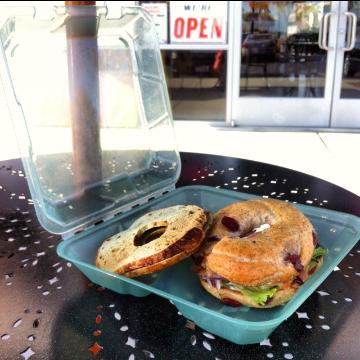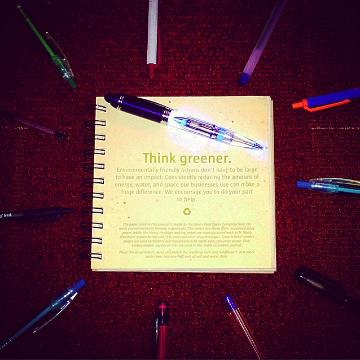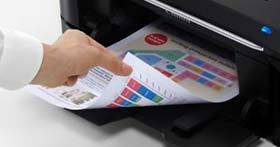With only one planet in a closed-loop system (where matter can change form, but never exit our world nor disappear completely) and a finite amount of natural resources and space for landfill waste, we must all reduce our consumption whenever possible.
Why is this important?
The EPA estimates that the average person creates 4.4 pounds of waste each day. With about 10,000 campus members, that's 10 million pounds of waste created by our campus for just 33 weeks of the year! So many of our day-to-day routines rely on the consumption of natural resources, and our mindful and minimal usage--without diminishing a fair and good quality of life--will transform SCU into a climate neutral and zero waste campus. Diverting waste is not an impossible task, but the entire community must participate for the University to reach its valiant goal by 2020. The importance of reducing the amount of waste we generate as well as keeping waste out of landfills is clear:
- Air quality will improve due to less trash incineration and landfill methane emissions.
- Less money towards hauling waste from campus.
- No landfill waste means better use of land and open space, as well as more materials to be reused, repurposed, recycled, and shared.
Tips for Reducing Waste:
- Strive for minimalism and avoid creating unnecessary or excessive waste
- Avoid one-time use containers like bottled water, take-out containers, and plastic bags
- Fill up your reusable container at our water bottle filling stations
- Join the campus Eco-Tray program
- Opt for a fabric or canvas tote bag when shopping
- Choose products with less packaging
- Eat only what you can finish or saving leftovers
- Try bringing Tupperware-like containers when dining out
- Reuse or re-purpose what we already have
- Check out Pinterest or our boards for inspiration
- Design an outfit for the annual Eco-Fashion & Art Show with worn-out clothes and recyclable or waste items
- Save money for memories rather than products
- Give the gift of an experience or do-it-yourself (DIY) gifts
- Do not purchase unnecessarily or as frequently
- Clothes: Embrace vintage and hand-me-downs; host a clothing swap party with friends. After the event, donate the rest. And if a new outfit is absolutely needed, go thrift store shopping, which has already-existing, new-to-you clothes. Buying new ones create more demand for companies to supply more.
- Electronics: Staying loyal to your current computer, tablet, or phone and not buying the latest every time. Corporations partake in what is known as “planned obsolescense.” This is the intentional production of consumer goods that are designed with nondurable products with hard-to-repair or limited quantity of spare parts. The goal of many corporations is to make as much profit as possible, so they frequently sell a “good product” and promote it as the “better product” in order to phase out the earlier model. Often times, this becomes unnecessary as the first version sufficiently gets the job done.
- Joining Stop Junk Mail San Jose to keep your mailbox from flooding with unwanted mail and to reduce your household waste
Programs on Campus:
From reading the waste signs and informing peers about what you know, to boosting the share economy around campus, every Bronco can contribute to helping us reach our SCU zero-waste goal. There are programs all throughout campus to make it easier for everyone to participate:
- The Pat Malley Fitness & Recreation Center hosts Terracycle brigades, or collection programs, in the main hallway past the front desk for protein bar wrappers, Brita filters and pitchers, personal beauty and care products, as well as other universal or e-waste like ink cartridges and batteries.
- Residence halls and some academic buildings across campus offer paper towel composting.
- Benson Memorial Center offers Eco-Trays, which are dishwasher-safe, reusable to-go containers that can be washed for you.
- Inside the Benson Memorial Center, on the west side (Swig Hall side), the Share Shelf is hosted in a glass room and offers students, faculty, and staff a free alternative to buying new school and office supplies at the bookstore.
Improving the waste diversion rate and cutting down on excessive consumption will be essential in reaching the zero-waste goal by 2020. You can learn even more about the importance of sorting waste correctly by coming to a Waste Characterization! If you have suggestions for improvements, or questions regarding waste on campus, please email recycling@scu.edu or view our Waste webpage.
- The Share Shelf
Located inside the Benson Memorial Center, on the west side (Swig Hall side) in a room next to the restrooms, the Share Shelf serves as a physical site for students, faculty, and staff to donate and acquire used office and school supplies.
- The Lending Library
The SCU Lending Library is an online site for SCU employees to borrow items shared by other departments. Have a lamination machine you don't often use? Let others borrow it! Need to decorate for an 80's themed event? See if others have decorations you can borrow.
- Duplex Printing
Minimize paper waste through duplex printing, or printing double-sided, which is available in the residence halls, as well as specified Learning Commons printers. Students who choose this option will save $.02 on every page they print. Here's how to set up duplex printing for your computer: Instructions for Mac users and Instructions for PC users.
Statement for faculty syllabi
Duplex printing
For all paper assignments and class readings, please print double-sided. Printing double-sided costs two cents less per page, and it also reduces the amount of paper waste generated on campus. All residence hall and library printers are capable of printing double-sided.




